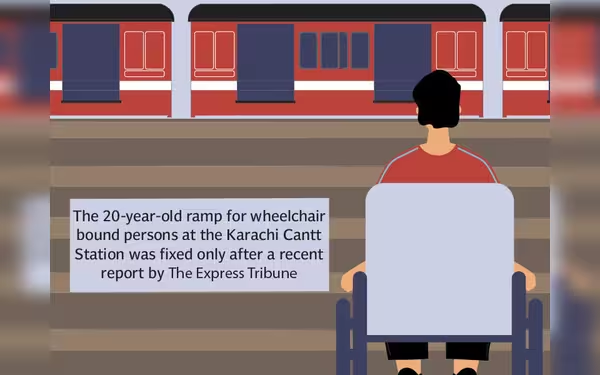Saturday, November 16, 2024 07:50 PM
Disabled Rail Passengers Face Accessibility Issues in Pakistan
- Disabled passengers struggle with inadequate railway facilities.
- Lack of ramps and accessible restrooms at stations.
- Urgent need for inclusive public transportation reforms.
 Image Credits: tribune.com.pk
Image Credits: tribune.com.pkDisabled rail passengers in Pakistan face significant accessibility challenges, highlighting the urgent need for inclusive transportation reforms.
In Pakistan, the needs of disabled rail passengers have often been overlooked, raising serious concerns about accessibility and inclusivity in public transportation. The railway system, which serves millions of passengers daily, has not adequately addressed the requirements of those with disabilities. This oversight not only affects the dignity of individuals but also limits their mobility and independence.
For instance, Abdul Rehman, a wheelchair-bound passenger traveling from Lahore to Rawalpindi, shared his challenging experience of boarding a train. He described the struggle he faced due to the absence of ramps and other necessary facilities. "It was a nightmare trying to get on the train. I had to rely on the help of strangers, which is not something I should have to do," he lamented. His story is just one of many that highlight the urgent need for improvements in the railway system.
Asma, another differently-abled passenger at the Lahore Station, echoed similar sentiments. She pointed out the lack of accessible facilities at the station, stating, "There are no proper restrooms or waiting areas for people like us. It feels like we are invisible to the authorities." Her experience underscores the importance of creating an environment where all passengers, regardless of their physical abilities, can travel with ease and comfort.
The challenges faced by disabled rail passengers are not just about physical barriers; they also reflect a broader societal issue regarding the treatment of individuals with disabilities. It is essential for the government and railway authorities to recognize that accessibility is a fundamental right. By investing in proper infrastructure, such as ramps, elevators, and designated seating, they can ensure that everyone has the opportunity to travel without fear or difficulty.
The plight of disabled rail passengers in Pakistan calls for immediate action. It is crucial for authorities to listen to the voices of those affected and implement necessary changes. By doing so, they will not only enhance the travel experience for disabled individuals but also promote a more inclusive society. Everyone deserves the right to travel freely and with dignity, and it is high time that the needs of disabled passengers are prioritized in our railway system.













